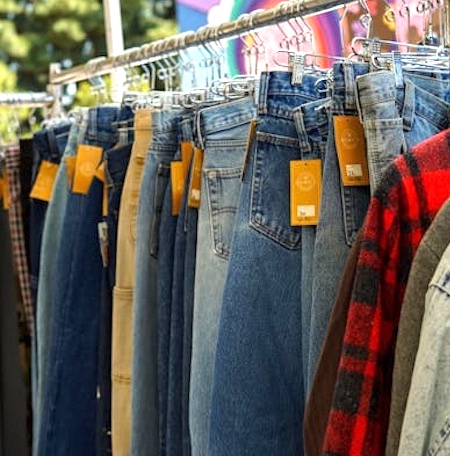Resale in Fashion: The Value of Retail’s Circular Economy

24-07-2025
By Amber Hovious, VP of Marketing and Partnerships at Teamwork Commerce

The fashion industry has long thrived on reinvention – but today, true innovation is being driven not only by what’s new, but also by how retailers extend the life of what already exists. Once a niche concept, resale is now a central force in shaping a more sustainable and forward-looking retail landscape.
The resale market in retail is a key component of the circular economy, with the aim to extend product lifecycles for the better. According to a Business Waste report in 2024, only 8% of old clothes are reused and only 10% are recycled across the globe. These figures highlight the urgent need for change – and the powerful opportunity resale presents to retailers ready to adopt circular economy principles.
Retail leaders today must reframe how their organisations – and their customers – define value. The modern consumer is increasingly purpose-driven, and sustainability has become a business imperative rather than a marketing differentiator. Brands that integrate circular economy principles into their core strategy will not only deliver on consumer expectations but future-proof their business.
Resale as a strategic growth driver
Resale is more than just a trend; it’s a strategy that embraces the full potential of a product’s lifecycle. More retailers are adopting resale, rental fashion and trade-in programmes to re-engage customers. This is an effective way for fashion brands to attract new customers and for brands to drive growth for a more sustainable and ethical future. It wouldn’t be an exaggeration to say that resale is gaining ground as a commercial and ethical priority.
From brand-owned resale platforms to rental fashion and trade-in initiatives, fashion retailers are now beginning to recognise the untapped potential of circular business models. Not only do these programmes reduce waste, they also re-engage existing customers and attract new ones by offering accessible, conscious alternatives to traditional buying.
Strategically, resale enables retailers to unlock value well beyond the initial point of sale. Rather than seeing an item’s end-of-life as a loss, fashion brands can now view it as the beginning of a renewed customer journey – one that drives revenue while reinforcing loyalty.
Consumer demand for sustainable practices
Conscious consumption is no longer a fringe behaviour; it is becoming a mainstream expectation. Modern shoppers particularly Millennials and Gen Z, are on the lookout for brands that reflect their environmental and ethical values.
This shift represents a clear signal to executives: align your brand with these values or risk irrelevance. Leading brands no longer asking whether sustainability matters – they are asking how to operationalise it at scale, and how to communicate it credibly.
Brands that align their operations with consumer values can attract a wider range of customers and develop more meaningful relationships, particularly among younger generations who are driving the change. More importantly, they can differentiate themselves in a competitive market where purpose is becoming just as critical as product.
Achieving operational efficiency and saving costs
Sustainability and efficiency are no longer at odds. Implementing circular economy practices – such as resale and reverse logistics – can help brands optimise inventory management, reduce overproduction and minimise waste-related costs. As a result, retailers can achieve significant cost savings.
Through resale, not only is waste reduced, but what was once a loss can be turned into profit – opening new revenue streams. The price of inaction is fast outpacing the cost of implementing meaningful change.
Establishing brand reputation
Today’s shoppers don’t just buy products – they buy into values. While resale provides value to consumers, it also reaffirms and elevates brand reputation. Implementing resale strategies demonstrates a retailer’s commitment to sustainability in a way that is tangible and actionable. More importantly, it’s also a message that resonates deeply, particularly in a climate where greenwashing is under scrutiny and authenticity matters more than ever.
How to use tech to implement resale and circular economy models
Modern tech solutions play a critical role in enabling resale and circular economy models to scale efficiently, reliably and profitably for retailers. From advanced point-of-sale (POS) and inventory systems to real-time data analytics platforms, there are several solutions that fashion brands can lean on to strengthen their resale operations:
A) Integrated POS and inventory solutions
Integrated POS systems and inventory solutions can help fashion retailers enhance overall supply chain visibility in real-time. They can track a product throughout its lifecycle – from first sale to resale or return. By integrating resale into advanced inventory systems, retailers can identify items eligible for resale, automate restocking of refurbished or second-hand goods and track condition, age and previous ownership of returned items – all of which are essential parts of resale models.
B) Item-level RFID
For modern POS and inventory systems to work, they require real-time and accurate data. This is where RFID technology comes in – facilitating accurate data in real-time. This means retailers can track their inventory at item-level, helping them make more informed decisions. This also allows retailers to maintain transparency with their customers, enabling shoppers to track their orders in real-time and eliminating guesswork.
C) Real-time data analytics
Utilising real-time data provided by RFID, advanced AI analytics platforms can predict which items will retain value in the resale market. AI models can also analyse overall data to recommend resale pricing based on demand, condition and historical trends. Meanwhile, retailers can use analytics to optimise stock replenishment to reduce overproduction. This prevents markdown waste and enables smarter merchandising, both for new and resale collections.
The takeaway
Technology is the enabler – but strategy is the differentiator. Retailers that align intelligent tools with clear circular objectives will outpace competitors still relying on linear models. Brands that invest in the right retail infrastructure to support resale ecosystem are better positioned to operate more sustainably, drive profits and align with the expectations of today’s conscious consumer. Resale is not just about keeping clothes in circulation – it’s also about using technology to redefine value, ownership, and retail success.























